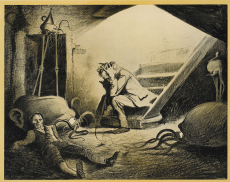
The narrator, being representative of the middle class within the novel, is again, disproving the accepted structure of society by displaying open emotions, and not taking care of those who ‘don’t know better,’ making Wells’ points about socialism ever stronger. However, even after the devastation inflicted so far, there is still clear evidence of society being withheld; ‘He was hatless, and his coat was unbuttoned.’ If society had completely crumbled, the narrator wouldn’t have bothered himself over the artilleryman’s slightly unruly appearance; this pushed the reader even harder into questioning whether they themselves would be concerned with dress codes after surviving as well as seeing such atrocities. But, ‘Then he abruptly sat down before the table, put his head on his arms, and began to sob and weep like a little boy, in a perfect passion of emotion,’ does tell us that the working class of society has crumbled, by describing the artilleryman as ‘a little boy,’ as well as saying he expressed a lot of emotion; if one class, at the root of society, falls, the next will surely follow.
To reinforce the inaccuracy of classes in society, the narrator – middle class and well educated – makes a huge mistake, endangering many lives; ‘The terrible heat-ray was in my mind. To get under water! That was it! “Get under water!” I shouted unheeded.’ This is obviously a foolish thing to say, as you would be boiled alive in the water, yet the narrator seems agitated that he is not being listened to. The reader may be shocked, thinking that only a lower class person would say something so ridiculous. ‘I faced about again, and rushed towards the approaching Martian, rushed right down the gravelly beach and headlong into the water. Others did the same.’ This is another reference of humans being like animals; following each other like sheep, because they can’t think for themselves. Further on in the chapter, the humans receive a minor victory against the Martians, decapitating one by hitting it with a gun; ‘The Martian within the hood, was slain and splashed to the four winds of heaven.’ This clearly conveys the message that, for now, some of society is still surviving, as soldiers have been organised and ordered to attack the Martians, and succeeded, which wouldn’t have occurred had society collapsed completely.
Chapter thirteen is when Wells introduces the reader to the third primary character, the Curate, who is Wells’ representation of religion. From the first description of the Curate; ‘His face was a fair weakness, his chin retreated, and his hair lay in crisp, almost flaxen curls on his low forehead, his eyes were rather large, pale blue and blankly staring,’ we can see Wells’ disapproval of religion, as he is showing this character to not only be weak, but baby-like, and quite unintelligible, as he was ‘blankly staring.’ As religion was such a vital part of Victorian society, the audience may have been swayed by such an unflattering image of a religious figure, causing them to doubt their own beliefs, so they unknowingly accept socialism and evolution more willingly.
Image: http://monsterbrains.blogspot.co.uk/2015/04/henrique-alvim-correa-war-of-worlds.html

0 Comment:
Be the first one to comment on this article.